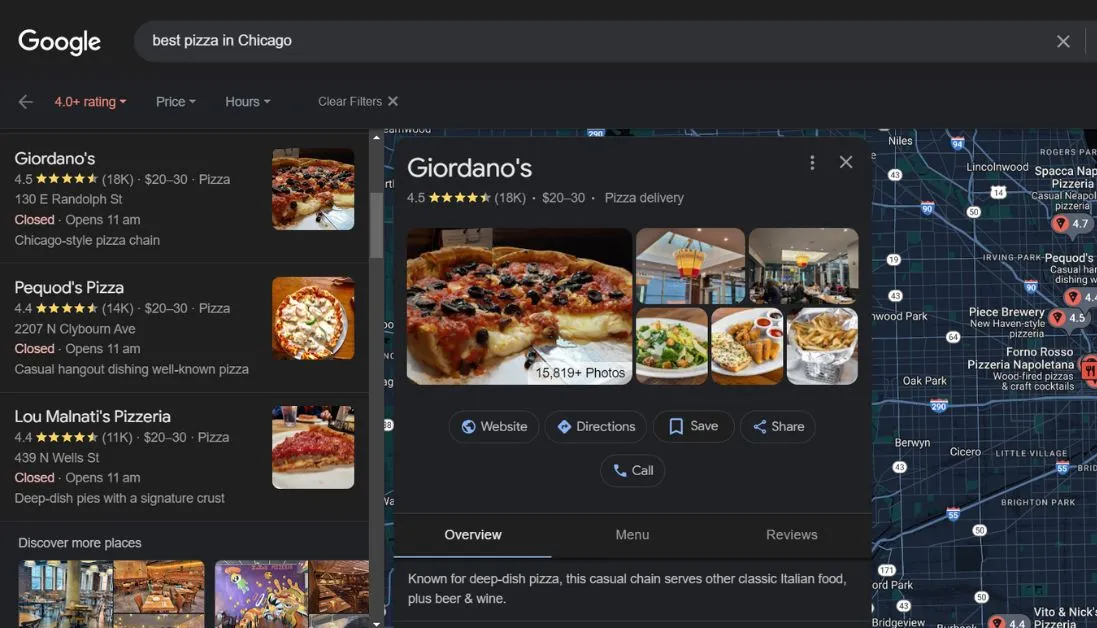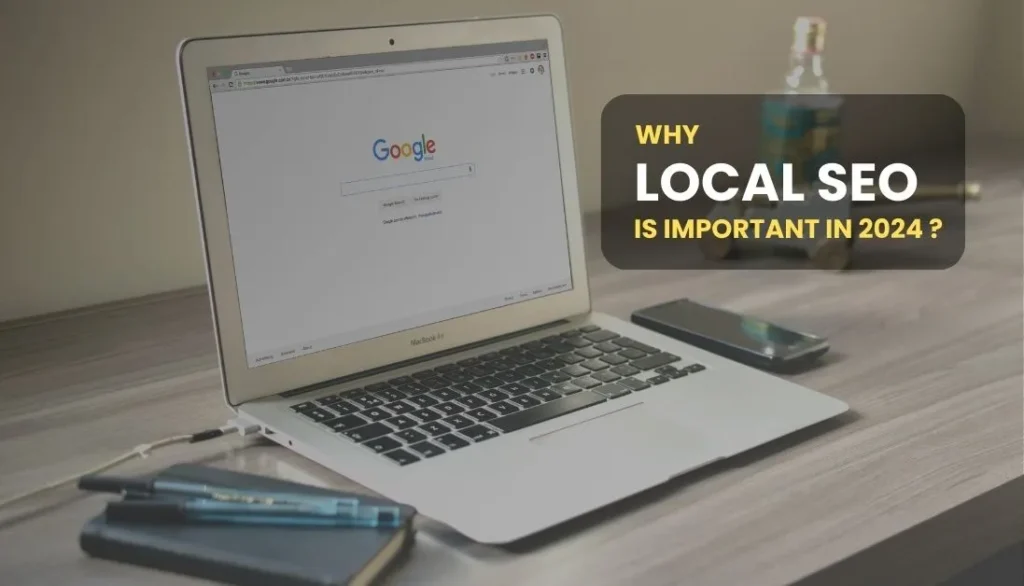In today’s world, one must find ways on how to differentiate its product or service to its competitors and more so to small businesses. Understanding why local SEO is important in 2024 is crucial because it opens the door for your business to become easily visible in your community, and therefore, attract more customers to your premise.

What is Local SEO?
Local SEO (Search Engine Optimization) is the process of optimizing your online presence to attract more business from relevant local searches. These searches occur on Google and other search engines and usually involve location-specific queries. For example, when a user searches for ‘best pizza in Chicago’ or ‘plumbers near me’ the local SEO helps your company or business to appear in the top results.

How Local SEO Differs from Traditional SEO
Unlike traditional SEO, which focuses on ranking for national or global keywords, local SEO narrows in on specific geographic locations. It’s especially beneficial for businesses with physical locations or those offering services within a particular region.
For instance, if you own a bakery business in Brooklyn, there’s little benefit to showing up in search results in Miami. Local SEO helps your business appear for relevant searches in your area, making it more likely that you’ll attract local customers.
Why Local SEO Is Important
Improved Online Visibility :
Local SEO puts your business on the map—literally! Optimizing for local search will make your site more visible in the Local Pack or Google Maps, which are prime spots for attracting clicks and foot traffic.
Increased Web Traffic :
With the rise of mobile devices, more people are searching for products and services on the go. Local SEO helps ensure your business is easy to find by potential customers, increasing traffic to your website and ultimately your storefront.
Higher Conversion Rates :
Probably the even bigger advantage that local SEO brings to the table is the fact that it targets more users who are likely to purchase your product. More to this, research has confirmed that approximately 78% of mobile searches conducted in the local area lead to a purchase. That’s because when people search for local services or products, they’re usually in the final stages of the buying process.
Cost-Effective Marketing :
Traditional advertising methods such as billboards or radio ads are costly and broad in their reach. Local SEO offers a more cost-effective approach by targeting consumers who are actively looking for your products or services in your area.
Builds Trust and Credibility :
When your business appears in local search results, it builds trust with potential customers. Google’s algorithms take into account reviews, local citations, and other trust signals, making it more likely for users to choose a business that ranks higher in search results.
Key Local SEO Strategies
- Optimize Your Google Business Profile : Your Google Business Profile (formerly Google My Business) is a crucial component of local SEO. It makes it easier for Google to know what your business is all about and where you are situated. Your profile should be updated and contain relevant information like the address phone number, hours of operation and website link. Adding high-quality images and responding to customer reviews can also help boost your profile’s ranking.
- Ensure NAP Consistency : NAP stands for Name, Address, and Phone number. This means making sure your Name, Address, and Phone Number (NAP) are the same on all sites you advertise on, your website, social media, and any local listing services. Inconsistent information can confuse search engines and harm your rankings.
- Local Keyword Optimization : Just like traditional SEO, keyword optimization is vital for local SEO. However, the focus here is on geo-specific keywords. Include location-based keywords in your titles, meta descriptions, and content. For example, if you’re a florist in Austin, phrases like “Austin florist” or “flower delivery in Austin” should be naturally integrated into your content.
- Get Listed in Online Directories Make sure your business is listed in major online directories like Yelp, Yellow Pages, and TripAdvisor. Many of these directories are well-ranked in search results and are thus can act as another way through which potential buyers find your business. In this case, the greater number and quality of citation sources will increase your probability for a better ranking in the local search.
- Encourage Customer Reviews : Reviews are one of the most important ranking factors for local SEO. Ask your happy customers to write positive reviews on Google and on any other platform of their choice. This will also serve to enhance your online reputation, and since Google holds reviews in high esteem, business who consistently post high quality reviews, are often ranked higher on search results.
- Create Local Content : Producing content that’s relevant to your local audience is another great way to improve your local SEO. Blog about local events, news, or community updates, and include keywords related to your location. This helps establish your business as an authority in your area, attracting more local traffic to your site.

The Role of Mobile in Local SEO
Mobile searches have overtaken desktop searches in recent years, and this shift has significant implications for local SEO. The other important feature of the mobile users is that they search for business when they are in need of some service on the move. For example, someone driving around a new city may search for “restaurants near me” to find a quick bite to eat.
There’s no doubt that mobile friendliness of your website is very important. Google takes into account how well a site performs on mobile, which means a site that is not very friendly to phone means it will rank lower in the search engine. Besides, it is easier for mobile users to directly call you right from the search results having click-to-call buttons and simple to use navigation.
Common Local SEO Mistakes to Avoid
- Neglecting Google Business Profile Updates : Many businesses set up their Google Business Profile but fail to keep it updated. Inaccurate information, such as outdated hours of operation or incorrect contact details, can lead to missed opportunities. Regularly check and update your profile to ensure it’s accurate.
- Ignoring Negative Reviews : While it’s great to focus on gathering positive reviews, ignoring negative reviews can harm your reputation. Respond to negative feedbacks appropriately and professionally with appropriate consideration for the sentiments of the customer. This shows potential customers that you care about their experience, and it can even turn a negative situation into a positive one.
- Failing to Optimize for Mobile : Given that so many local searches occur on mobile devices, it’s crucial to ensure your website is fully optimized for mobile users. Failing to do so can result in a poor user experience, leading to higher bounce rates and lower rankings.
- Not Utilizing Local Backlinks : Backlinks are essential for traditional SEO, but they’re also important for local SEO. Aim to get backlinks from other businesses, organizations, and directories within this area. These links also serve to bring traffic flow but more importantly, they inform Google that your business is very much part of the local community.
The Future of Local SEO
Local SEO has become much more dynamic over the years. Considering the trends in the developing voice search and artificial intelligence, local SEO is expected to lean even more into personalization. Voice search queries are often longer and more conversational, which means businesses will need to adapt their SEO strategies to capture this traffic.

Additionally, as Google continues to refine its algorithms, we can expect an even greater emphasis on local intent and proximity-based searches. Businesses that stay on top of these trends and continue to optimize for local search will be well-positioned for future success.
FAQs
1. What is the difference between local SEO and traditional SEO?
Local SEO focuses on optimizing your website for location-based searches, whereas traditional SEO aims to improve your site’s visibility on a national or global scale. Local SEO is more relevant for businesses that operate in specific geographic areas.
2. How long does it take to see results from local SEO?
Typically it takes about three to six months for things to start improving when dealing with the local SEO results in most of the businesses. It is possible to make the process faster through consistency in optimizing the google business profile, reviewing and building backlinks, locally.
3. Why are online reviews important for local SEO?
Online reviews signal trust to both potential customers and search engines. Google also looks at review entries when making a ranking of businesses since businesses with the most favorable reviews have a higher chance of coming out at the top.
